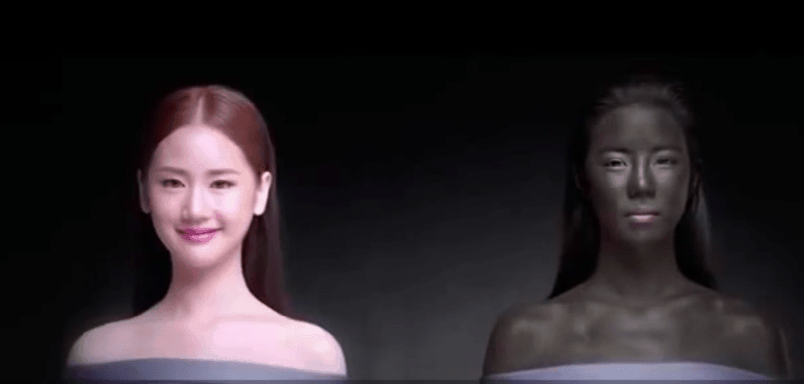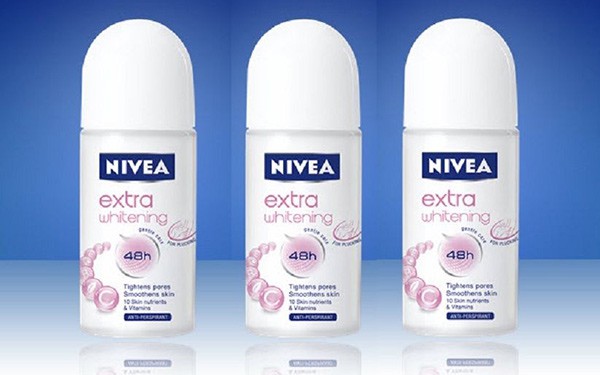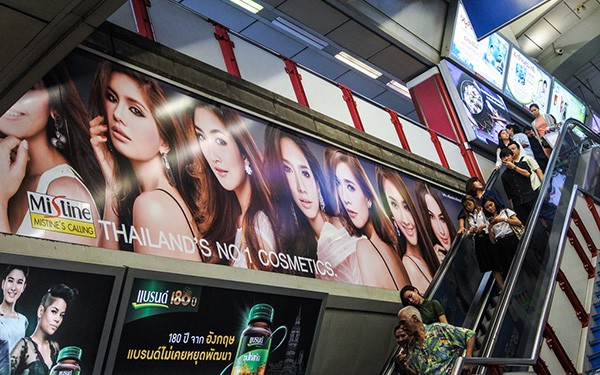Whether it be body size, body shape or the lack of cellulite one might acquire, many different entities have been defining and redefining beauty standards for decades. Keeping up with these trends is not only exhausting, but oftentimes unhealthy or even dangerous.
One beauty trend seemingly difficult to follow because of the weather alone is the so-called “whitening craze,” which is very popular in various Southeast Asian countries, Thailand being one of the biggest offenders.
Many things, however, are leading some Bangkokians to believe that this trend is a diminishing one.
The Whitening Craze
You cannot escape them. They are as prevalent in the media as there are cars off Sukhumvit Road during rush hour.
From billboards to television commercials via sky train, Bangkok is smothered with advertisements stressing the importance of the beauty of having fair skin.
In a country where the sun constantly beats down upon its inhabitants, how do Thais, or anyone for that matter, keep up with such a seemingly steep beauty standard?
The answer is: they don’t.
Well, some of them don’t.

Screenshot from the Seoul Secret ad. Via YouTube
While the number of people protecting themselves via umbrella from the aggressive sun is not necessarily diminishing, not everyone is ready to jump on the bandwagon of, “Just being white, you will win,” as said by Thai actress Cris Horwang, in an advertisement for Seoul Secret beauty product, Snowz. In fact, some are seeking quite the opposite.
“Will it work in a country that cherishes white skin?” Jeff Amato, CEO of BKKSUN, asked himself before deciding to open Thailand’s first tanning salon in Bangkok. It launched in January of 2016.
“Skin whitening in Asia is a cultural phenomenon and is very big business in Thailand,” Amato said. “But tanning is trending in Thailand, with major celebrities getting behind the beauty and feel good effect of tanning.”
One such celebrity is Nonthawan “Maeya” Thongleng, Miss Thailand’s World 2014 winner. Her naturally bronzed skin had her making headlines, being referred to as “dark beauty” and “Pocahontas.”
While Amato’s key demographic are European expats, he said he has seen a steady flow of Thais making their way to BKKSUN.
Is Tanning Trending?
Amato’s idea stemmed from something he found he himself was lacking in his own life as an expat in Bangkok: the simple luxury of sunbathing.
Something that might have been so seemingly easily obtained back in the U.S. was literally impossible to find here in the City of Angels.
Every hotel and spa he reached out to did claim that yes, they did have a sun bed: a bed that was in area where the sun might hit, depending on the hour of the day. Otherwise, only shaded “sun” beds were available.
“I saw a niche that hasn’t been filled in our market,” Amato said.

Photo via BKKSUN
Amato is not the only one going against the grain of this whitening craze. Tan Thailand was, surprisingly, launched last January as well. According to a spokesman for the magazine, the idea behind launching was to encourage readers to travel and experience the culture of Thailand, without worrying about the sunlight.
The magazine said that the skin whitening craze is becoming a thing of the past and that the obsession with having fair skin is slowly fading from the Bangkok scene.
Which, quite frankly, is a good thing.
Are whitening creams safe?
Lightening components can be found in everything from body lotions to make-up remover: some companies have even gone so far as to offer vaginal bleaching products.

Even whitening deodorants are often spotted on Thailand’s shelves.
But shouldn’t we consider what might go into the making of these products before getting so… intimate with them?
According to the Centers for Disease Control and Prevention, mercury salts are sometimes used in skin lightening creams and as antiseptic creams and ointments. Since 1989, the Food and Drug Administration in Thailand legislated that mercury and mercury components were prohibited cosmetic ingredients.
That did not stop it from showing up in 1 in 5 face whitening products, however.
In July and August of 2012, the Foundation For Consumers and the Ecological Alert and Recovery – Thailand (Earth) published results from experiments on 47 different types of whitening creams sold throughout Thailand. The study gathered products all over the Kingdom, from Issan to Bangkok.
What were the results? Mercury, in an alarming number of creams.
The study also found that the contaminated products contained ‘incomplete labeling’, meaning many of them did not include the name of the manufacturer, the expiration date of the product and other useful information consumers might deem important before slathering on a cosmetic.
That being said, none of the tested creams that were contaminated with mercury were purchased in Bangkok. So while capital city dwellers might be safe from poisoning their skin for the time being, not all of us living around Thailand are so lucky — or so it seems.
Who is at Risk?
Some have speculated that only low-cost whitening creams are the ones containing a high level of mercury contamination. With a staggering 10.9 percent of Thailand’s population living below the poverty line, it would seem that those challenged by poverty are also more at risk of purchasing beauty creams that can harm them, as well.
The study overruled this notion, however.
It found there was no correlation between the price of a product and the level of mercury contamination.
In fact, the results proved quite the opposite. The three most expensive whitening creams purchased were all contaminated with mercury (3,435 to 47,960 parts per million), while the three cheapest creams had none in them at all, or less than 0.05 ppm.
Long story short: regardless of how much you are willing to spend on purchasing only the safest and ‘best’ whitening creams, you could still be at risk upon application.
But if Thailand is becoming more open to the idea of tan skin, perhaps this isn’t as much of a problem as it first appears?
However, some disagree with the very idea that this whitening craze is coming to an end, after all.

A popular cosmetics company advertize their products on fair-skinned models on the BTS (via m-louis .® – CC BY-SA 2.0 licence)
“Products are currently coming out that vary in speed of (whitening) results,” said Nicole Kanman, executive assistant at the National Paralympics Committee of Thailand.
“If anything, the market is moving towards faster result methods such as laser and injections.”
In addition to lasers and injections, other treatments such as dermabrasion and chemicals peels can be found in in salons in Bangkok as a means to getting whiter skin.
The emergence of these treatments have led Kanman to believe that the usage of skin whitening products is not necessarily slowly diminishing throughout Bangkok; rather, the method or ways in which people are lightening their skin is changing.
“People consume market trends and end up spending hours and money on trying to be different and thus portray a form of low self-esteem,” Kanman said.
“People who ‘embrace’ their skin color try to shine in other ways such as with personality or skills; this gives out an element of charm.”
Whether you are tan, pale or freckled, it is important for everyone to embrace their skin color, whatever color it may be. You might not ever achieve your preferred level of white, and you might not always have a perfect, glowing tan… and that is OK.
“All skin colors and all people are beautiful,” Amato of BKKSUN said.
Featured image is by Poramate V (CC BY-ND 2.0 licence)


